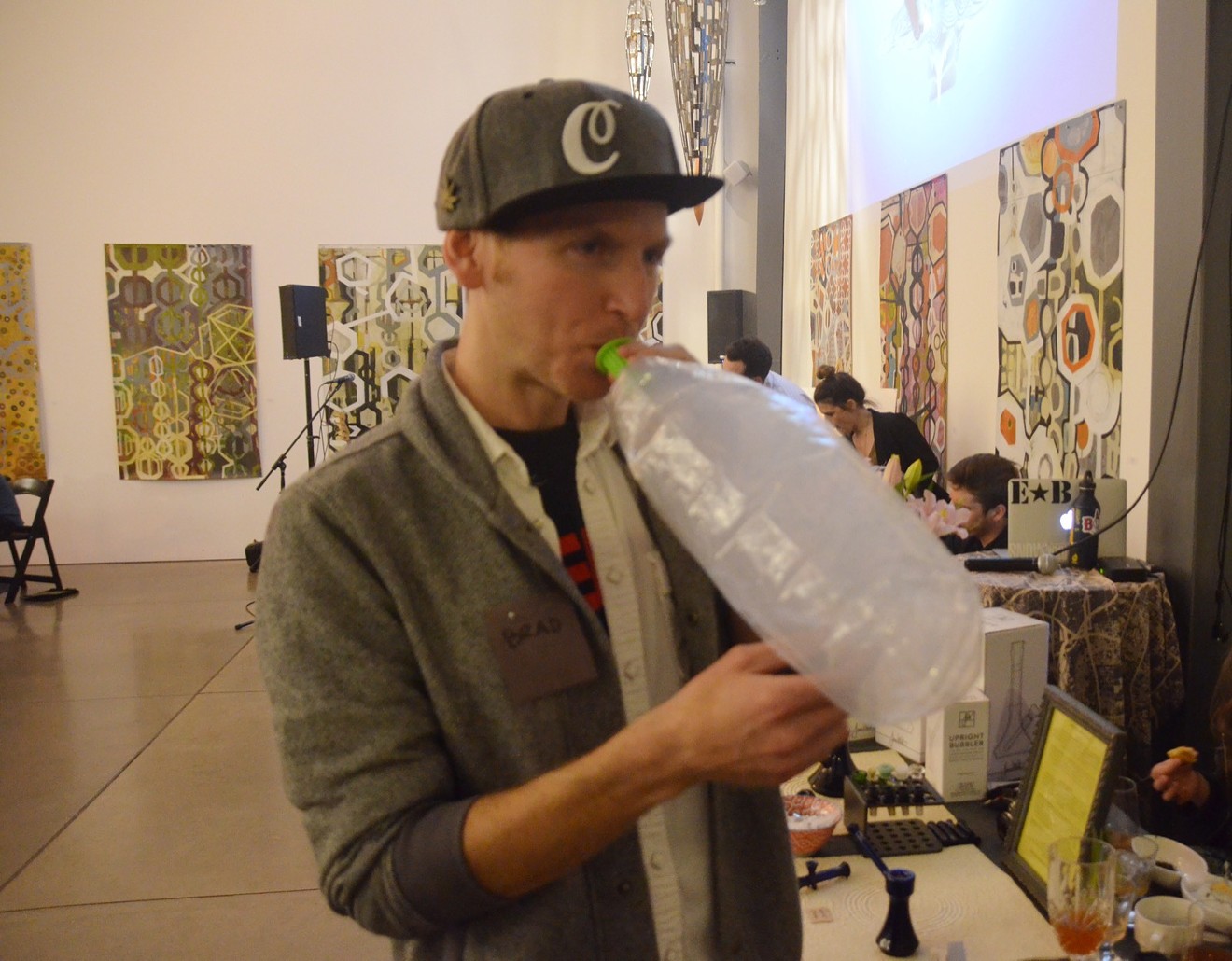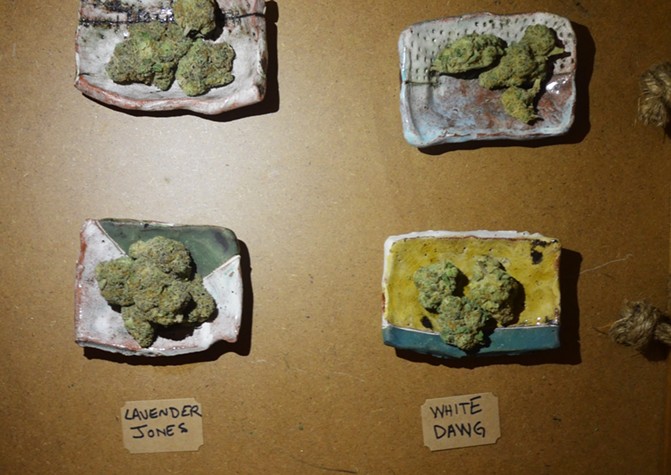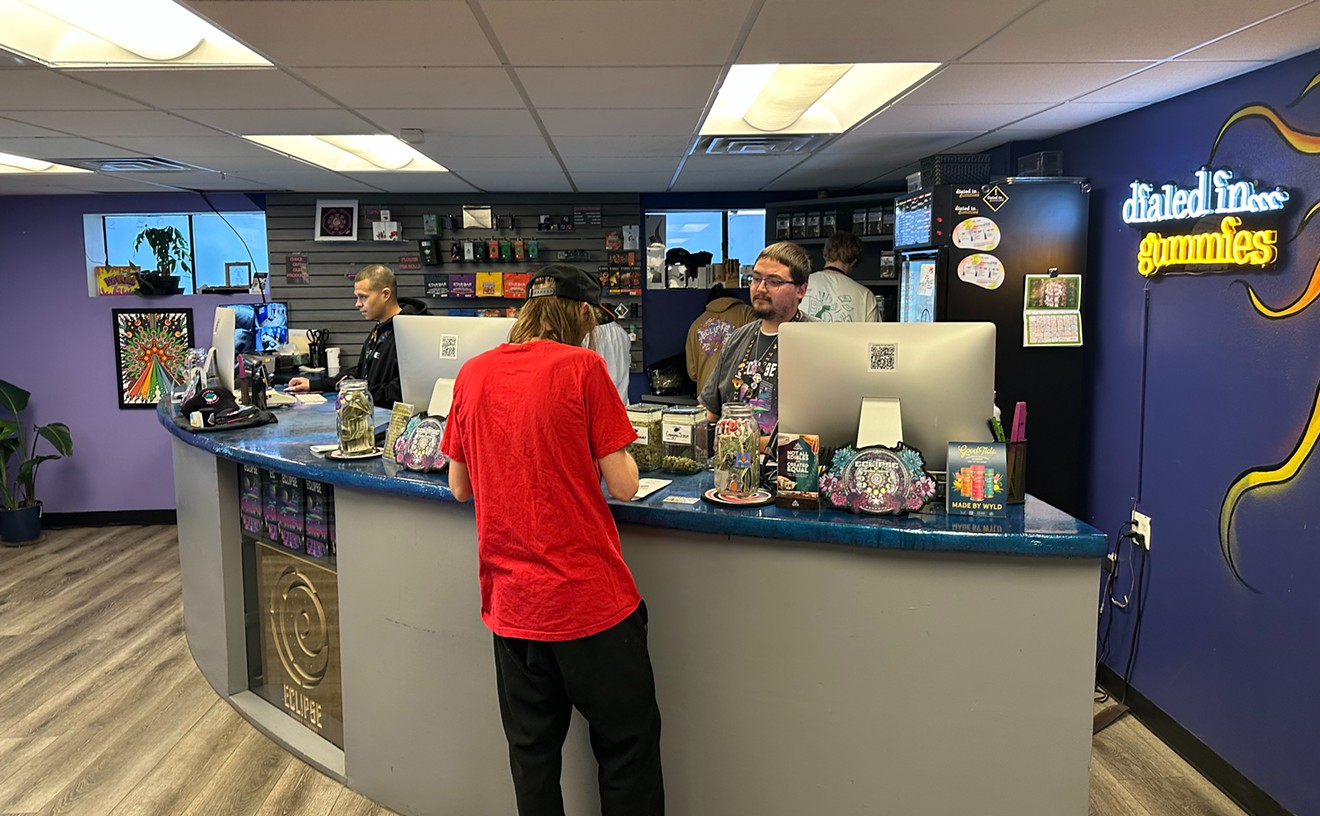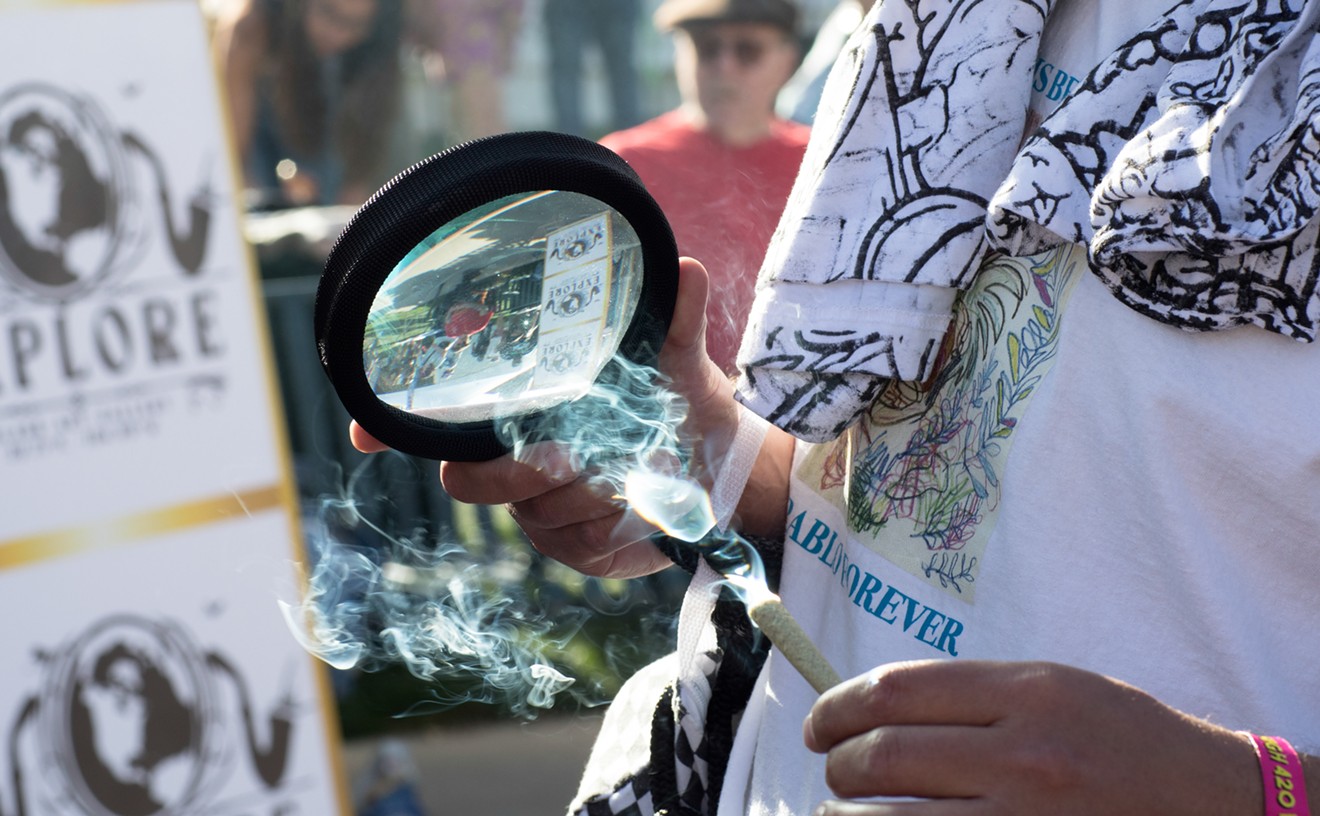Mixing gourmet food and premium cannabis was a hot topic for white-collar America after the New Yorker's April feature story on the "Martha Stewart of edibles," a Portland food writer who holds cannabis-infused dinners at her home. The story was nothing new to us in the Mile High, of course, where there have been plenty of edibles, both legal and illegal, to choose from for quite some time.
But what if you want to separate weed and food while still enjoying them together?
As cannabis use becomes more accepted by the mainstream and Denver finalizes the Initiative 300 pilot program, which will allow qualified businesses to apply for social-consumption permits, more Colorado chefs and restaurant owners are exploring cannabis use at special events or their own eateries. It isn't easy: Proposed I-300 regulations require that any social-consumption area be 1,000 feet away from any school, child-care establishment, drug or treatment facility, or city park, pool or recreation center. Making things even more difficult, the Colorado Liquor Enforcement Division banned marijuana use at any establishment with a liquor license right after I-300 passed.
Yet there's still hope to bake for the baked, according to a group of commercial cannabis dining veterans and regulation experts. EatDenver, a nonprofit group of independent restaurants, held a panel discussion June 14 at which chefs and restaurateurs could learn about cooking and serving around legal marijuana consumption. Panelists included Mason Jar Events founder Kendal Norris, Boulder chef/restaurateur Hosea Rosenberg, and Ireland Stapleton law group's Tom Downey and John Jennings. Between the unique event planner, award-winning chef and cannabis lawyers on the panel, attendees were served a heaping plate of tips for incorporating legal pot consumption into a catered event or their own place of business. Here's a helping:
1. Be proactive with regulations and venues
If you're planning on applying for a social-use permit or holding a private event with cannabis consumption, it's wise to talk to someone with experience and consult a lawyer first. Norris has been holding cannabis-pairing dinners for nearly three years, dealing with unique regulatory issues and resistant venue owners from the beginning. How does she manage to keep puffing along? "I try to think of every regulatory issue beforehand," she said, "and I explain exactly what I'm doing to venue owners."
According to Downey, if those venues are holding private parties on private land, or somewhere the general public cannot freely enter, then they should be fine as long as no one under 21 enters. Downey was the head of the Denver Department of Excise and Licenses while the medical marijuana industry blossomed in Colorado. He warned against selling or giving away any cannabis products to attendees, suggesting a situation similar to bringing a wine sommelier to your house party.
"If a sommelier brings wine, which he contracted or bought through a liquor store, then you can buy that wine from the sommelier, who is essentially the middle man, and give it your party guests," he said. "Then, if everyone wants to pitch in to pay you back, that's legal."
2. Don't quit your day job
The press, love and excitement gained from cooking at a cannabis event can be a little intoxicating, but not if your true love is food, according to Rosenberg. The Blackbelly Market founder and Top Chef contestant has cooked for six Mason Jar Events cannabis pairings, but says he never looks at it as anything other than fun.
"I'm a chef. My passion is cooking," he explained. "I'm going to make a lot more money selling wine than I am selling weed." Not that he'd have much of a choice: Making and selling edibles requires an infused-product license from the Marijuana Enforcement Division – and if you thought getting a liquor license was hard...
Translation: Cook food that people enjoy after they get high, not food people enjoy getting high on.
3. Tell your family and colleagues
Cooking for a cannabis event is technically aiding in a federal crime, even if none of the food you provide has marijuana in it. It's best to be upfront about your involvement, Rosenberg advised: Many chefs and restaurateurs have family members, investors and financial partners who can be financially and emotionally affected by the reputation change that working with pot can bring. Even in Colorado, it can still be a divisive topic. Your inner circle deserve a heads-up, at the very least.
4. It's still just serving food
"I'm basically treating it like a catering event," Rosenberg said. "I approach it just like I would a wine pairing."
Rosenberg typically does a taste test of each cannabis strain or product to see what food and drink will pair best with them, just as he does for any other event he caters. None of his servers touch cannabis or serve it to attendees, nor are they allowed to by law. Only the official event host and state-certified budtenders employed by the host can serve guests.
Keep reading for more tips on cannabis at dinner.
5. Explore the seasons
Norris holds dinner events for each season and takes them outside in spring and summer, tailoring each menu and experience to the current weather and colors. Her April dinner included tacos and salted pork, while one of her November brunches offered warm croissants and CBD coffee.
That rule can also apply for cannabis: Use sativa strains, edibles and concentrates for beginning courses and outdoor venues where there's more space to walk, and indicas and hybrids for warming up in the winter and relaxing muscles to make room for more food.
6. Get creative
Don't let strict and confusing regulations prevent pairing meals and cannabis. Improvisation and a sound knowledge of rules can help you legally maneuver around local consumption laws. While Rosenberg cannot legally cook with cannabis or serve it to guests, he can bring ingredients or nearly cooked food to the event and let the guests put it on themselves. Guests have been able to add infused butter or oils to their food or shave infused chocolate over desserts at previous Mason Jar dinners, he pointed out.
Jennings had a shrewd and interesting proposal for restaurants interested in pursuing a social-consumption permit while maintaining a liquor license: "If a social-consumption area isn't allowed on the premises because it has a liquor license, then maybe you could modify the premises so that area is no longer part of your liquor license."
7. Be clear with the media
Be clear about your responsibility with the event. If you're just providing food, let the media know that, and point out that your employees aren't touching cannabis, advised Rosenberg, who tends to keep his Mason Jar and Top Chef credits on separate résumés. "Don't let reporters ask leading questions about your consumption if you don't want to be known for that," he added. Acting like an NFL coach with the media isn't just about maintaining his reputation with his cooking peers: The feds read the New Yorker, too.
"Federal law trumps state law at the end of the day. You're aiding and abetting a federal crime, even if it's legal here," Downey said. "Home Depot is aiding and abetting by selling soil or equipment to growers. The IRS is for accepting tax revenue. The legal line stretches far, but the powers-that-be choose where to enforce it."
8. Have transportation covered
If a guest at your event or restaurant social-consumption area smokes one bowl too many and drives into a tree after leaving, you're liable, just as a bar would be for letting a drunk patron drive home. "We want these people to enjoy themselves without worrying about how they're getting back," Norris said. Each of her Mason Jar events has shuttles to and from the venue for guests.
9. Use those pesky terms and conditions to guard you
Convincing people to sign their name on a document noting that they're smoking weed or might be smoking weed can be uncomfortable, but it's a necessity. I-300 states that no business with a social consumption area can let patrons in without a signed waiver, and private events require similar user agreements.
Why? "It's as simple to get them to agree to the terms and conditions during registration online," Norris said, explaining that the waivers force guests to acknowledge liability concerns, such as being responsible for the amount of THC they consume, and not buying or selling any cannabis product at events or in social-consumption areas.
10. Bring dessert — lots of it
All stoner stereotypes aside, the munchies are no joke. And the longer they last, the bigger your sweet tooth gets. Mason Jar dinners typically consist of five courses, and all of them are paired with a new cannabis product.
After guests have consumed enough marijuana, Rosenberg concluded, "No one really cares what we're saying. As long as you keep giving them food and have a lot of dessert, you're good."
[
{
"name": "Air - MediumRectangle - Inline Content - Mobile Display Size",
"component": "12017618",
"insertPoint": "2",
"requiredCountToDisplay": "2"
},{
"name": "Editor Picks",
"component": "17242653",
"insertPoint": "4",
"requiredCountToDisplay": "1"
},{
"name": "Inline Links",
"component": "18838239",
"insertPoint": "8th",
"startingPoint": 8,
"requiredCountToDisplay": "7",
"maxInsertions": 25
},{
"name": "Air - MediumRectangle - Combo - Inline Content",
"component": "17261320",
"insertPoint": "8th",
"startingPoint": 8,
"requiredCountToDisplay": "7",
"maxInsertions": 25
},{
"name": "Inline Links",
"component": "18838239",
"insertPoint": "8th",
"startingPoint": 12,
"requiredCountToDisplay": "11",
"maxInsertions": 25
},{
"name": "Air - Leaderboard Tower - Combo - Inline Content",
"component": "17261321",
"insertPoint": "8th",
"startingPoint": 12,
"requiredCountToDisplay": "11",
"maxInsertions": 25
}
]















